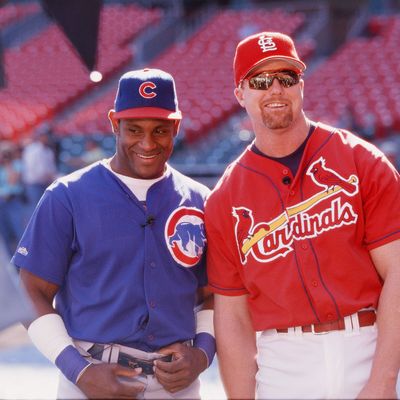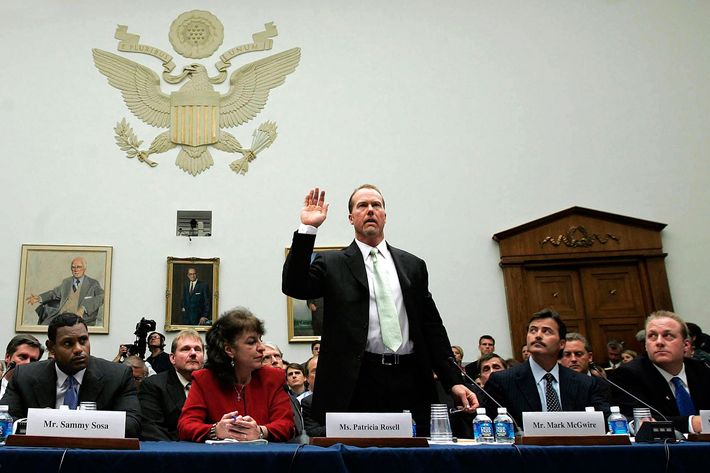
Last weekend, my beloved St. Louis Cardinals mercifully at last fired their staggeringly incompetent manager Mike Matheny after six-plus years of clubhouse mismanagement, clownish bull-pen management, and a fundamental misunderstanding of the double switch. As always happens within minutes of any manager or coach being fired, the Possible Replacements list popped up, and this list included familiar names like Houston Astros bench coach Jose Espada, former Yankees manager Joe Girardi, and current Cardinals interim manager Mike Shildt. But the most familiar, and perhaps the most stunning, was one you probably haven’t thought about in a while: Mark McGwire. McGwire is currently a bench coach for the San Diego Padres, a fact you probably didn’t know, because the last time Mark McGwire came across your mind was likely 2010, when he gave a high-profile interview to Bob Costas on MLB Network in which he admitted to using performance-enhancing drugs during his playing career.
This interview cemented the hostility of many who felt betrayed by McGwire, whose memories of that beautiful summer of 1998, when McGwire and Sammy Sosa raced to break Roger Maris’s 37-year-old home-run record, were now sullied by the Steroid Era. After the interview, McGwire’s vote totals for the Hall of Fame immediately began to plummet — he’s now off the writers’ ballot all together — and he was lambasted in the public arena. That night on NBC Nightly News Brian Williams was so upset that he was visibly shaking on the broadcast. “Because this is a family broadcast we probably can’t say what we would like to about the news today that Mark McGwire, the home-run hitter, the fan favorite from the St. Louis Cardinals, stopped lying today and admitted that he did it while on steroids,” Williams, who was himself later canned for overhyping his own experience as a war reporter, lamented. “An American tragedy.”
While Williams and the rest of the world went about overcoming the American tragedy of a man occasionally taking some pills 20 years ago, McGwire went about his business as a Major League Baseball coach. (His desire to get back into the game was the reason he gave the Costas interview in the first place.) In those eight years, McGwire has won a World Series ring as hitting coach for the Cardinals in 2011, gotten back on the Hall of Fame Veterans Ballot, and now, as a coach with the Padres, one of baseball’s most forward-looking, innovative organizations, is considered a manager-in-waiting for any available openings. USA Today said of all the candidates for the Cardinals’ job, McGwire “made the most sense.” McGwire has gone from being a baseball pariah to being the guy everybody wants in charge.
It’s not just him, of course. Sammy Sosa was just on the cover of Sports Illustrated two weeks ago. Bartolo Colon, suspended 50 games for PEDs in 2012, is currently the game’s most beloved folk hero. Andy Pettitte, who has admitted to HGH use, probably received more applause than any other Yankee at Old-Timers’ Day. Barry Bonds’s and Roger Clemens’s Hall of Fame voting numbers go up every year. And the most amazing of all, Alex Rodriguez, who was until recently the most despised man in professional sports, is now one of MLB’s most visible ambassadors as the lead co-analyst for ESPN’s Sunday Night Baseball (the game’s signature Game of the Week). That Alex Rodriguez, who was once suspended an entire season for PEDs, is the Face of Baseball is a rather staggering development, like suddenly learning that Gary Condit is now vice-president, or Phil Spector is hosting the Grammys from prison.
Given how American cultural memory works, with even the real sins of the past often fading into comfortable nostalgia, the rehabilitation of baseball’s most notorious PED users — none of them history’s greatest monsters — was probably inevitable all along. I’d also argue it was fully justified. There was no reason to treat these people so poorly when their steroid use was revealed in the first place. In one form or another, athletes have always been desperate for an advantage in a ruthlessly competitive marketplace, and their biggest crime was adding to their rigorous training regimen some supplements that would only endanger themselves (and even that was overstated) and which, by the way, the league tacitly approved of (before 2002, there wasn’t even steroid testing in baseball).
There has long been an argument among those who believed much of the PED hysteria was lunacy — who claimed, as science advanced, someday we all would look back at Bonds and McGwire and mock then not for cheating, but for using such primitive performance enhancers like “the cream” and cattle steroids. But it’s not just the science that evolved: Our mind-sets on what classified as “cheating,” or how much this even matters at all anymore, are different than they were a decade ago. The writer Joe Sheehan, in particular, has raised the plausible possibility that there wasn’t even a “PED era,” whatever the talking heads would have you believe — that there was no anomalous boom in home runs in the 1990s at all. More to the point: Who gives a shit about this stuff now?
When you look back at the PED panic in the age of Trump, it looks more and more like one of those First World problems, the sort of national scandal you invent because there are no actual national scandals to deal with, or at least none that you want to. Not to get too heavy-handed here, but this was a country reckoning with its status as a single global superpower, keep in mind, and wanting desperately, especially after 9/11, to believe in the innocence of its own power. That infamous congressional testimony given by Sosa and McGwire and Jose Canseco and Rafael Palmeiro back in 2005 looks absolutely ridiculous now, the sort of theater indulged by a country that didn’t have the very foundation of democracy to worry about at the time. And without the inclination to worry at all about the foundation of democracy being laid, or not laid, in the country we had recently bulldozed through as a show of strength with very flimsy justification. Yes, that’s right — this was the most high-profile congressional hearing of 2005, when the Iraq War was just two years along. (Then–mostly unknown Representative Bernie Sanders openly mocked those hearings from the chamber, saying, “I am overwhelmed by the kind of media attention this has gotten. I have counted dozens of TV cameras, and I think some of the American people wonder, ’Is this all we do?’” Apparently!)

Today, the PED panic looks more and more like the last gasp of a fading generational outrage, an emotional outburst and response to an increasingly wonkish and data-driven world: It feels more like Baby Boomers pounding their fists angry that it’s not 1961 anymore and athletes are not powered by Ovaltine the way they were told when they were 12. (Never mind that Hank Aaron, often held up as the “true” home-run champion, has admitted that he took amphetamines as a player and that he would have taken PEDs, had they been available.)
That Boomer outrage, of course, is still manifested in the White House — Trump used to call A-Rod “Druggie A-Rod” on Twitter. But in baseball, it has mostly been left behind. Even more than its more fashionable cousin basketball and its more popular cousin football, the sport is run by data nerds from Harvard and Wall Street now, and they have no moral illusions about the game. They grew up with McGwire and Sosa, not Willie Mays and Mickey Mantle, and all they care about is production. Players who have been busted for PEDs have still been rewarded with eight-figure contracts and honored with coaching jobs and reverence among fans. (Bonds is still given a standing ovation in San Francisco every time he shows up, and he was a hitting coach himself in Miami in 2015.) When Robinson Canó was suspended for PEDs earlier this season, the response was not, “How could Robinson Canó have been lying to us? What will we tell the children?” It was, “How are the Mariners going to replace him at second base?” The answer was Dee Gordon, who was suspended for PEDs himself in 2016. Few felt bothered to even bring that up.
You see this most powerfully in Hall of Fame voting, which was once the moralist writer’s last refuge to combat the PED plague. Neither Bonds nor Clemens has been voted in, but their each year their ballot numbers have improved. Perhaps more notably, the fact that the two best players of their generation, and maybe two of the best of all time, still aren’t in the Hall of Fame is increasingly being seen less as an ethical stand and more like a reason to ignore the Hall of Fame altogether. In a sport now populated with wonks looking for every little advantage they can find, how much fury can you direct at a player who looked for their own and tried to do everything he could to produce? In general we seem to have gotten over our faux-naïveté about the powers of the rich and powerful, and the aggressive pursuit of success required by anyone trying to hustle their way to greatness — in sports and out. And in an age where clubs are hacking other club’s databases, why is “cheating” reserved for players anyway? The tide has turned a bit, and fans gripe less about the salary greediness of players; they’re much more likely to complain about selfish owners and the hostility of the league to change. Bud Selig oversaw the entire PED era, such as it was, and he breezed into the Hall of Fame on his first shot. Why is this supposedly just A-Rod’s fault again?
Of course, much of this evolution just comes down to time. In the same way Pete Rose has more defenders now than he did ten years ago, the context of the crime in the era it was committed inevitably fades as the years go along. (This is not to forgive Rose, who broke baseball’s one sacred rule, but it is difficult to single him out as a monster when sports are cheerfully jumping on the legalized gambling train now to make a few bucks.) How long can you stay mad at someone for trying to hit a few extra homers or (more likely) to recover from an injury quicker? Why were we so taken aback by it in first place? In a world where the president of the United States is bowing to the leader of a foreign adversary, how much emotional energy can be expended on whether or not a guy stuck a needle in his ass two decades ago? No one has the emotional energy to care anymore. We probably shouldn’t have cared in the first place.
Which is great news for Mark McGwire. If he does get the Cardinals job, it will be the return of a Cardinals icon so beloved that the team once commissioned a statue of him to place outside Busch Stadium. That statue, because of the PED scandal, has never been seen; it remains in the basement of the man who sculpted it. It now seems as silly that the statue would be hidden as it once was that we were so scandalized that it existed in the first place. One of the advantages of getting older is that you grow enough to look back 15 years ago and realize how, for a while there, you lost your goddamned mind. We’re not there with PEDs yet. But we’re close. I’ll have to tune into ESPN and see what Alex Rodriguez has to say about it. He is, after all, now the voice of the establishment.
Will Leitch’s Games column runs weekly. Email him at [email protected].






























